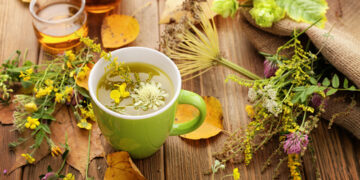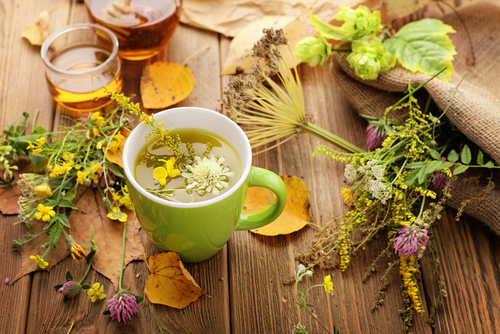The Soothing Steam of Stillness
There is something sacred in the act of brewing tea. It begins slowly—the sound of water warming, the rustle of dried leaves and blossoms, the gentle scent rising from the cup. It is a ritual that asks nothing but your presence. In a world that so often demands urgency, tea offers a moment to soften the edges, to breathe, to come home to yourself.
Among the most comforting of herbal rituals are those crafted for stress relief. Not all tension can be untangled at once, but nature offers us allies—plants with deep roots and ancient wisdom, known for their ability to steady the nervous system and restore balance. These are the adaptogens and gentle nervines: herbs and flowers that do not mask stress but help the body remember how to move through it with grace.
Ad Spot #1
(Insert your first promotional element here.)
A Cup from the Wild: The Role of Adaptogens and Nervines
In the old stories, there were always herbs for sorrow, herbs for courage, herbs to lift a weary heart. The plants we now call adaptogens were known by other names—hearth-strengtheners, life-root, fatigue-chasers. These are herbs that help the body adjust to stress, not by dulling the senses, but by offering quiet endurance.
Alongside them are the nervines—herbs that calm the mind and soothe the spirit, like a hand resting gently on your shoulder.
These plants do not force. They suggest. They remind.
Some have grown wild on mountainsides and riverbanks for centuries. Others have found a home in cottage gardens, their roots entwined with old kitchen doorsteps. All of them bring the same message: slow down, soften, breathe.
Flowers and Roots That Ease the Mind
Tulsi (Holy Basil)
A sacred plant in Indian households, tulsi is more than a culinary herb. It’s considered an adaptogen that balances cortisol levels and helps the body cope with physical and emotional stress. With its slightly spicy, clove-like flavor, it makes a grounding base for any calming tea.
Lemon Balm
Beloved for its lemony scent and gentle touch, lemon balm is a soothing nervine with a long history in European folk medicine. It calms frayed nerves, lifts mild melancholy, and is especially useful when the heart feels anxious. Its light, citrusy flavor blends well with nearly everything.
Ashwagandha
This earthy root is a cornerstone of Ayurvedic tradition. Known for its ability to strengthen resilience and lower anxiety, ashwagandha has a deep, slightly bitter taste. Best simmered slowly or paired with warming spices like cinnamon or cardamom.
Lavender
Used for centuries to ease restlessness and overthinking, lavender brings a floral sweetness to blends. A little goes a long way, both in scent and effect. It’s a beautiful addition to evening teas, particularly when paired with lemon balm or chamomile.
Chamomile
A familiar friend to many, chamomile is a nervine that invites both body and mind to relax. Its golden flowers hold compounds that gently support digestion, tension, and sleep. In stressful seasons, chamomile becomes a daily ally.
Oatstraw
Made from the green stems of the oat plant, oatstraw is a deeply nourishing herb—especially for those feeling burned out or emotionally depleted. Rich in minerals, it restores gently over time. Its taste is grassy, soft, and comforting, like hay warmed by the sun.
Crafting Your Own Calming Blends
The beauty of herbal tea lies in its intimacy. You gather, blend, steep, sip. It’s a slow medicine, built from the rhythm of your own hands.
Here are a few blends to try. Feel free to adjust them based on what you have, or what you’re drawn to. Let intuition guide your hand.
Evening Exhale
-
1 tsp chamomile
-
1 tsp lemon balm
-
A pinch of lavender (no more than a few buds)
Steep in hot water for 7–10 minutes. Drink warm, an hour before bed.
Root & Resilience
-
1 tsp dried tulsi
-
½ tsp ashwagandha root
-
1 slice of fresh ginger
Simmer the ashwagandha and ginger in water for 10 minutes, remove from heat, then add tulsi and steep for another 5. Drink slowly, especially during anxious afternoons.
Heart-Ease Tonic
-
1 tsp oatstraw
-
1 tsp lemon balm
-
½ tsp rose petals (optional, for sweetness and uplift)
Steep for 10–15 minutes, covered, to preserve the delicate oils. This is a wonderful blend when emotions feel heavy or scattered.
Ad Spot #2
(Insert your second promotional element here.)
A Note on Preparation and Care
While herbal teas are among the gentlest forms of plant medicine, it’s important to honor their potency with care and awareness.
Adaptogens like ashwagandha are generally well-tolerated but may interact with certain medications or conditions. Pregnant or nursing individuals, or those managing thyroid or blood pressure concerns, should consult a knowledgeable practitioner before using such herbs regularly.
Herbal teas made from flowers and leaves—like chamomile, lavender, and lemon balm—are milder, but allergies can still occur, particularly in those sensitive to plants in the daisy family.
When in doubt, begin with a small cup, sip slowly, and listen to how the body responds. The relationship with herbs is built over time. It’s not about immediate results, but steady support.
Let the Steam Rise
There is quiet power in letting your tea steep while you step away from screens, from noise, from lists. In the simple act of pouring hot water over dried leaves, you return to something older than stress itself: the remembering that healing begins in stillness.
A cup of tea will not solve everything. But it can anchor you. It can soften the moment. And sometimes, that is enough.
These herbs do not promise escape from stress—but they do offer presence, restoration, and the slow, sturdy resilience that grows from within.
So gather your blend, inhale the warmth, and let each sip carry you a little closer to ease.



























